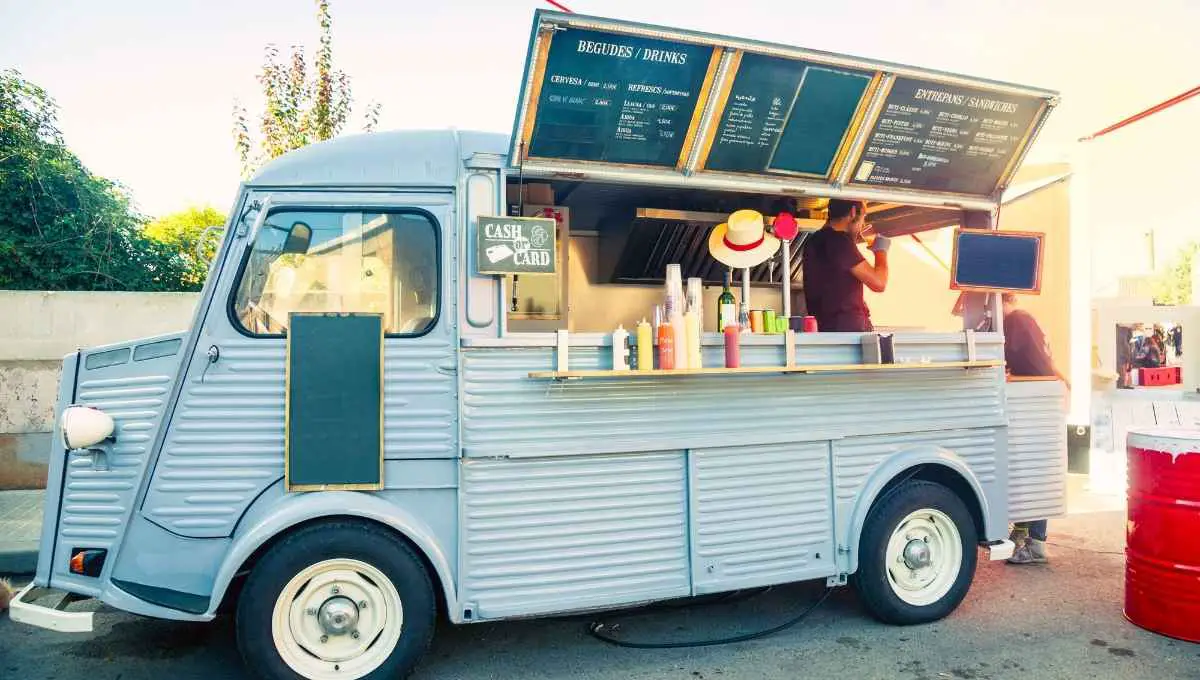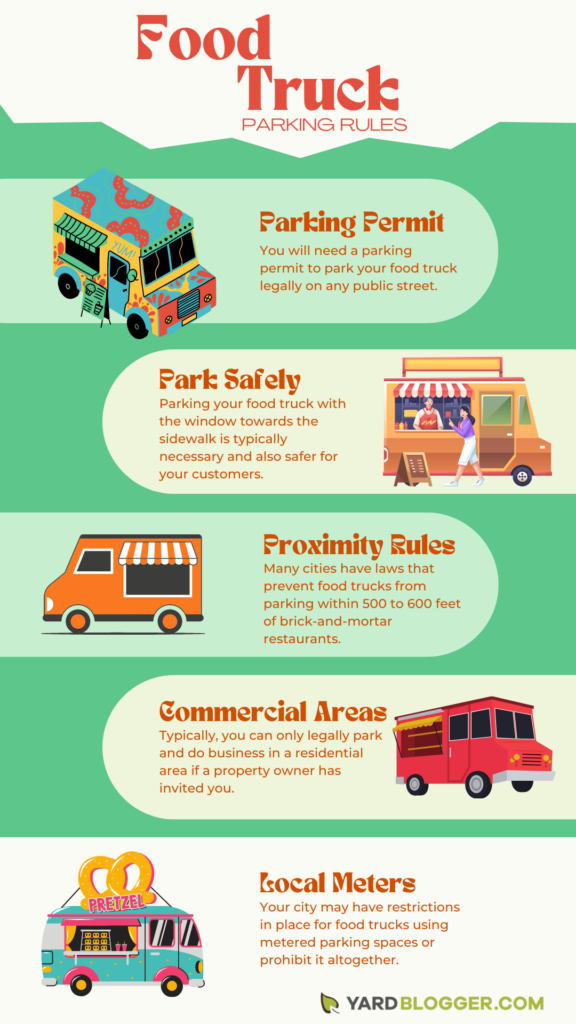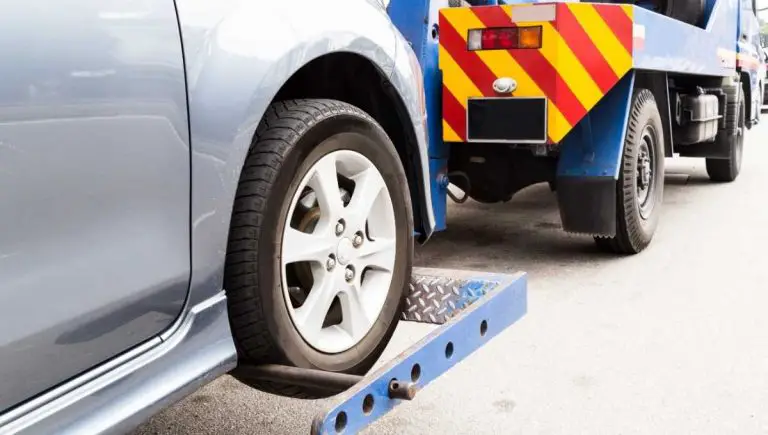Can I Park a Food Truck in My Driveway? (Parking Laws)

If you’re a food truck business owner, the thought of parking your truck in your driveway may have crossed your mind. It’s a great way to save on rent and get extra business exposure. But is it legal? And more importantly, is it allowed in your neighborhood?
Most cities will allow you to park a food truck in your driveway under certain conditions. Food trucks are considered commercial vehicles and are subject to parking regulations. Check with your city’s zoning department to see if restrictions exist on parking food trucks in residential areas.
If your city doesn’t allow food trucks in residential areas, there are a few other options. In this blog post, we’ll explore other options for parking your food truck and where you can find more information on food truck regulations in your city.
This post contains affiliate links from Amazon and other stores. This means Yard Blogger may earn a commission if you make a purchase using any of our links. Please refer to our full affiliate disclosure policy for full details.
Here’s a Quick Pro Tip!
Whether you are new to the food truck business or a “seasoned” veteran, knowing the road rules will elevate your game, increasing profits and avoiding citations. Brush up on your food truck knowledge with these helpful resources.
Our favorite food truck resources from Amazon:
1. Food Truck Business – A useful book covering business plans, profits, and scaling.
2. Food Truck Business 2022 – A practical guide to running a successful business.
3. How to Start a Successful Food Truck Business – Learn to earn full-time income!
My House and Neighborhood
When you own a residential property, you can use it however you want, right? Well, technically, you still need to abide by local regulations.
One of these regulations will be about the storage of commercial vehicles.
Can I Park My Food Truck at My House?
Generally, you are allowed to park only one commercial vehicle on your private property – with the condition that you own both the property and the vehicle. These regulations differ per state, though.
For example, in New Jersey, you can only park one commercial vehicle on your property if it weighs less than 10 tons (20 000 pounds).
Food trucks can sometimes weigh more than 10 tons due to the large number of appliances found in food trucks.
Can I Leave My Food Truck on My Property?
The answer differs per state or city. Some jurisdictions allow one commercial vehicle on your private property, while others do not allow any commercial vehicles. It would be best to contact a local city official to check.
In large urban areas, you will likely need to keep your food truck at a commissary or at the vending location, which you would need a permit for.
In rural areas, you might be allowed to park your commercial vehicle on your private property.
Where Can I Park a Food Truck?
You can park your food truck near most public spaces with the necessary parking permits. For example, sports stadiums or college campuses usually are quite popular spots to park a food truck.
However, don’t feel fixed to one permanent spot. One of the biggest advantages of a food truck is being able to move around and find your ideal customer base.
Ensure your parking permits are in order, and regularly move your truck.
Can Food Trucks Drive Around Neighborhoods?
Usually, food trucks are not allowed to drive around in neighborhoods since cities have location zone restrictions. The exact regulations are different per city, so it would be best to ask a county clerk for advice.
If the Home Owners Association of a community invites you to drive your food truck in their neighborhood, you would still need specific permits from the city.
You will also likely only have one specific spot where you can operate within certain hours.
Where Not to Park a Food Truck?
Proximity rules and location zones differ in each city, but a food truck is generally not allowed to be parked on any street without a parking permit. Normal parking laws, like not parking in front of a fire hydrant, must also be adhered to.
Occasionally, food trucks are not allowed to drive around or park in residential areas. You should always check with a county clerk where you are allowed to park and where you are not.
Parking Your Food Truck
So, where can you store your food truck if you can’t park it in your driveway? In this section, we’ll look at alternative options for storing your food truck overnight or longer.
Is There a Food Truck Parking Lot?
Since food trucks are not really allowed in residential areas, they can be parked in food truck commissaries overnight. Although this parking is not free, you would need to pay between $200 – $1000 a month depending on your city.
Food truck commissaries are more than just a big parking lot, though. Many of these spaces offer kitchen space, cold storage, and truck maintenance.
Making it the perfect spot to recuperate and store your truck for the night.

Food Truck Parking Space?
Many people think of street parking when they think of a food truck. However, parking in the street and selling food from your food truck is often illegal. The safest option would be a local food truck park.
You might think parking near other food trucks is bad, but when multiple food trucks are parked together, the variety attracts even more customers.
Outside an office or business park is another great option to feed hungry employees during coffee breaks.
Food Truck Parking Permit?
Parking permits are one of the many permits you need to operate a food truck legally. These permits allow you to sell food from your food truck in a particular area if you adhere to the set rules and regulations of the area.
In some states, a food truck parking permit is entirely free. In other states, it might cost about $100.
Usually, these permits are valid for a few years if you stay within the city zones as declared on your permit.
What Are the Food Truck Parking Rules?
The most important rule is always to park safely and follow the general parking rules of the state. Park with your order window facing the sidewalk, and don’t park in front of fire hydrants or too close to a crosswalk.
Check the local proximity rules of your city, as many have rules regarding how close you may park to a permanent restaurant.
Food trucks are not really allowed in residential areas unless a homeowner or the HOA invited them.
Where Can I Park My Food Truck for Free?
There are no generic spots where you can park your food truck and do business without paying for a parking permit. Although if you build a good relationship with another business, you might be able to operate from their property.
Many businesses like wineries or breweries don’t really offer food options. They might offer a food truck a permanent spot on their property in exchange for a commission on their earnings.
Technically you would not need to get a parking permit for this scenario.
You might also enjoy our post on How to Stop Your Neighbors From Parking in Your Driveway
Private Property
When you own private residential property and a food truck, it will make sense to store your truck on your property.
However, this won’t always be legal. So in this section, we’ll look at some alternatives.
Can I Park My Food Truck Anywhere?
You cannot park your food truck anywhere you’d like. Cities have location regulations, proximity rules, and many other commercial vehicle parking bylaws. Each city has different regulations, so it would be best to check with a county official.
Many people assume that you can park a food truck anywhere on the street, but it is not allowed in most cities.
The best spots to park your food truck are near sports stadiums, beaches, or city parks.
Are Food Trucks Allowed on Private Property?
Food trucks are generally not allowed on residential properties, even if you own the property. It’s better to keep your truck parked at a commissary, or you can negotiate with a business to keep your food truck on their property.
Some cities do allow you to store one commercial vehicle on your property, but you’re not allowed to operate the food truck from a residential property.
If you own a commercial property, you can park your food truck on the property.
Can I Park My Food Truck in a Residential Area?
Food trucks are usually not allowed to operate in residential areas. This is primarily due to location zones and cities prohibiting commercial business in residential areas. There is one loophole, though.
You may park your food truck in a residential area if the Home Owners Association of the community invites you into the neighborhood.
A homeowner in the neighborhood can also invite you into the neighborhood. You still need parking permits and written permission in a residential area.
Do Food Trucks Pay for Locations?
Food trucks that are parked at festivals or other events usually pay rent to the event organizer. You can expect to pay $100+ to rent your spot with your food truck at an outdoor event.
Apart from events, food trucks that are parked around the city also need parking permits (which they should pay for).
Many businesses also rent out spaces on their commercial property to food trucks.
How Do You Secure a Food Truck Location?
The first step is to investigate where your potential client base is located. Do you want to cater to college students who want fast and fatty food? Or do you want to cater to business people who are on their coffee break?
After deciding on a location, go to your municipal building and consult a county clerk about parking permits there.
The clerk will inform you about the specific parking regulations for the city and inspect your food truck before releasing a permit.
Parking Your Food Truck Overnight
You can get creative with where you can legally store your food truck overnight. Let’s look at some options of spots where you can park your food truck overnight and what the best option for your situation might be.
Where Can I Park a Food Truck Overnight?
The most convenient place to store your food truck overnight is at a local food truck commissary. These are parking lots dedicated explicitly to food trucks or other commercial vehicles.
Check with your local authorities if they have an approved commissary list for your area. This will be a list of kitchens and commissaries that meet the environmental department’s standards.
If you own a commercial property, you can also store your food truck on the property overnight. Some states allow one commercial vehicle on a residential property, although not all do.
You might also enjoy our post on How to Get a Car Towed From Your Driveway Legally
What Is the Best Overnight Parking for a Food Truck?
The best and safest option is to store your food truck overnight in enclosed indoor parking. This might cost a little more than other storage options, but it is a good idea if you live in a not-so-safe area.
You could contact any garage storage facility and rent out one of the units to store your food truck. Usually, these facilities work on a monthly rent, so you would not need to pay day-by-day.
Where to Park a Food Truck Overnight?
You would need to find a space on a commercial property to store your food truck overnight. Some communities do not allow commercial vehicles stored on private properties.
Most big cities have multiple food truck commissaries. You can park your food truck in one of these parking lots for the night.
Alternatively, you can rent a garage in a storage facility to store your food truck under a roof overnight.
Can I Keep My Food Truck at My House Overnight?
It depends on the city where you live. Some cities allow one commercial vehicle per residential lot. Although, other cities do not allow any commercial vehicles on residential properties.
It’s best to ask a local city official about the exact regulations in your community. You should always keep an extra amount in your budget to rent out a storage space for your food truck.
This is something most new owners forget.
Related Questions
How Do Food Trucks Keep Food Cold Overnight?
Food trucks usually use commissaries or commercial kitchens’ kitchen facilities to keep their food cold and prepare it. In the morning, the driver will fill the retrofitted freezer with the food for the day.
Large cities will have multiple commissaries scattered throughout the area. You would see many food trucks parked at these commissaries overnight.
They pay a certain amount per night, week, or month to store their food truck.
Can Food Trucks Sell Alcohol?
Under normal circumstances, food trucks are not allowed to sell alcohol. The exact regulations differ significantly between the states, so they are allowed to sell alcohol on some rare occasions.
Liquor permits are controlled strictly by the state or city liquor control authorities. These permits are usually closely monitored and given set stipulations.
For example, people can only consume alcohol in a specific area near the truck.
Where Are Food Trucks Most Successful?
Food trucks can be found in almost any big city in America. They thrive where lots of people are. You will usually see a food truck or two in prominent business districts in the city or at local markets around the county.
New York, Las Vegas, Philadelphia, Miami, etc. Some of the most popular food trucks in the country can be found in these cities.
The bottom line is that a food truck will be successful anywhere there are many people.
Final Thoughts
Food trucks have become a part of festivals and big city culture.
It’s easy to envision a successful food truck company, just be sure to research whether you can keep the truck at your house or at a nearby storage facility.






